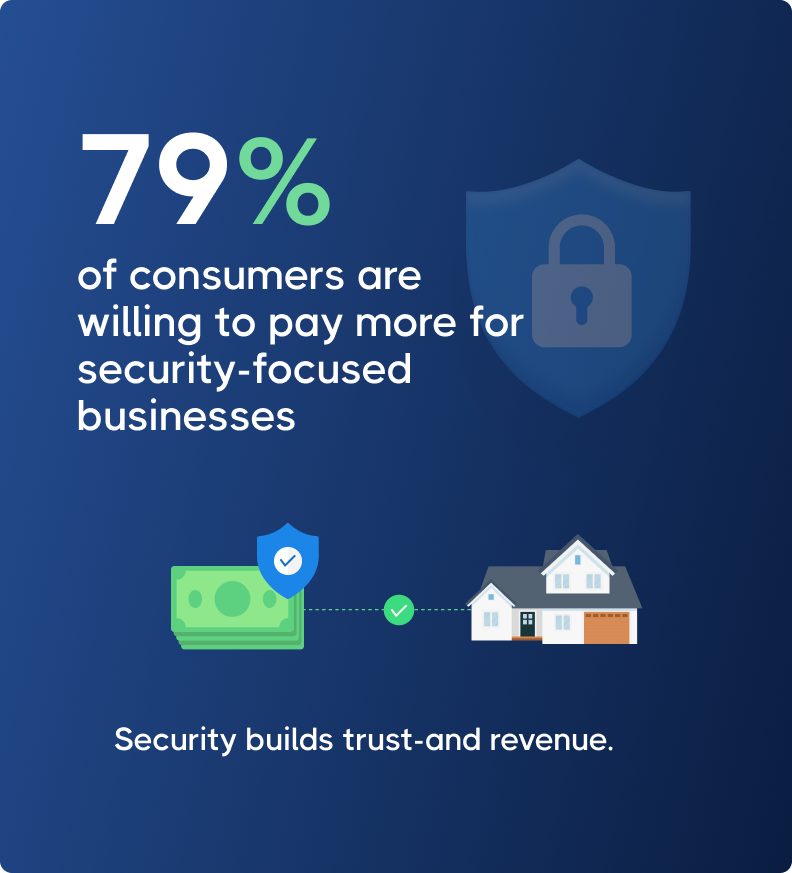AI in real estate: How technology impacts the industry
AI is changing real estate, from property valuations to wire fraud protection, helping professionals work smarter and safer.

Michelle Artreche
12 minutes
Artificial Intelligence
Sep 29, 2025
Oct 21, 2025
AI has become impossible to ignore in real estate. It speeds up document review, simplifies closings, and helps professionals work more efficiently with fewer errors. But CertifID’s State of Wire Fraud report shows fraudsters are also using AI to analyze data quickly and launch smarter, more targeted attacks.
What began as a tool for efficiency is now being used to exploit the industry, making it worth a closer look at how this technology is changing real estate.
How AI is transforming real estate
AI isn’t a futuristic idea in real estate.
AI is changing how the industry values properties, manages transactions, and serves clients. Teams use it for property evaluations and tenant management across the sector. For larger title companies handling 100 or more closings each month, AI helps teams scale faster while making fewer mistakes.
In practice, AI delivers results. Appraisers and agents gain more accurate property valuations by analyzing data quickly and spotting patterns people might miss.
On the client side, AI-powered chatbots and virtual assistants handle routine questions so staff can focus on tasks that require personal expertise. Property management teams also benefit as AI streamlines maintenance scheduling, rent collection, and energy monitoring.
The financial upside is impressive. Morgan Stanley Research projects $34 billion in efficiency gains for real estate investment trusts and commercial real estate firms by 2030.
Their study of 162 firms, 525,000 employees, and $92 billion in labor costs shows that 37% of tasks could be automated, particularly in management, sales, administration, and maintenance.
.png)
But AI's biggest impact might be where you least expect it: fraud prevention.
The same technology helping agents value properties faster is also helping fraudsters steal millions from real estate transactions.
Our research documented how criminal operations now use automated data collection to gather property information across entire markets in minutes.
This creates a new challenge for title professionals. The manual verification processes that worked against individual fraudsters aren't designed to handle coordinated, data-driven criminal operations targeting multiple transactions simultaneously.
Understanding how AI changes both legitimate business operations and criminal fraud schemes helps title professionals build defenses that match today's threat landscape.
Key ways AI is used in real estate today
AI is changing how properties are valued and how transactions are secured. Here’s a look at how it’s helping professionals work better.
Property valuation and prediction
Properties are valued with greater accuracy, taking the guesswork out of the process. Instead of relying only on manual comparisons, machine learning looks at huge datasets of sales history, market trends, and property details to deliver insights. These systems even pull directly from MLS records and public data, so values adjust in real time as the market shifts.
For real estate professionals, appraisals take less time and have fewer mistakes. It also helps reduce human bias, making valuations more consistent across different properties and markets. Investors gain an edge too, with AI spotting subtle pricing patterns that inform better timing decisions. The result is faster, fairer, and more accurate valuations.
Personalized customer experience
AI is improving client service in real estate. Chatbots can handle routine questions around the clock, giving buyers and sellers instant answers without waiting for a callback. Virtual assistants take it a step further, managing transaction updates and keeping communication organized.
With natural language processing, inquiries are automatically sent to the right team member, so clients get faster responses. This kind of support scales easily, letting even small firms deliver the kind of experience people expect from much larger companies. Instead of replacing human expertise, AI extends it, making every interaction easier and more efficient.

Improve the property management
Property management moves from reactive to proactive with automated tenant screening that looks beyond basic credit checks, analyzing background and behavioral data to predict which applicants are most likely to be reliable long-term renters. Predictive maintenance systems go further by using IoT sensors and machine learning to catch small issues such as water leaks or HVAC strain before they turn into costly repairs.
Smart building management ties it all together by automatically optimizing energy use and reducing operational costs. The result is less guesswork, more efficiency, and a clear return on investment for property owners.
Automated fraud prevention
AI is now a core part of transaction security in real estate. A great example of this is Identity verification. Platforms like CertifID analyze 150+ fraud indicators in real time, going far beyond a simple ID check. This thorough approach helps to uncover synthetic identities where real data is combined with fabricated details to create convincing but fraudulent ownership records.
AI stops business impersonation scams by spotting fraudsters who pretend to be law firms or title companies. It monitors device connections and geographic patterns, cross-references identity information against trusted databases, and flags inconsistencies that human review would likely miss.
For payoff verification, automated analysis blends OCR technology with fraud pattern recognition to instantly confirm payoff statements against lender databases.
End-to-end payment security backed by insurance completes the protection, removing manual gaps and ensuring that every transaction is safeguarded from start to finish.

Why title professionals need AI protection now
Fraud is getting sophisticated, and title professionals face bigger risks than ever. Understanding how AI is used across real estate makes it clear that manual checks alone can’t keep transactions or careers fully protected.
The evolution of fraud
Manual fraud detection is no longer enough. In the past, scams often involved intercepted emails or basic impersonation, but criminals now use AI to run far more convincing attacks. One of the fastest-growing examples is audio spoofing, where fraudsters use AI to clone voices and trick professionals into following fake instructions.
Embed: AI Audio Spoofing: How it Works | CertifID
According to CertifID findings: “It’s no longer possible for a business to rely on human efforts to catch communications that are slightly off, inspect IDs against a multi-point checklist, or detect changes to wire instructions.”
Fraudsters create fake identities by blending real people with false ownership records, slipping past traditional checks. Others launch full-scale impersonation scams, building fake law firms with spoofed websites and phone systems. Vacant land and commercial properties are frequent targets since owners often live elsewhere and cannot quickly confirm suspicious activity.
Why AI-backed verification is better than manual checks
Human analysis is limited, typically spotting only 3-5 obvious red flags per transaction. AI goes further by processing over 150 fraud indicators and identifying patterns across the industry. Individual firms working in isolation often miss broader attack strategies.
CertifID data shows that 65% of customers had at least one high-risk transaction flagged, protecting $1.32 billion in real estate funds.
These flagged transactions often bypass traditional checks like phone calls or document review, but automated analysis detects anomalies through pattern recognition and cross-referencing.
.png)
Professional liability consequences
Our data shows that 28% of title companies have sent funds to the wrong accounts because of fraud. Average losses are significant: $68,000 for buyer cash-to-close, $172,000 for seller proceeds, and $276,000 for mortgage payoffs.

These losses have prompted regulatory expectations to rise, with enhanced due diligence now required, and E&O insurance often demanding documented advanced verification procedures.
A missed fraudulent transaction can put careers on the line. Automated analysis provides critical professional protection, giving title professionals the tools to prevent losses and safeguard their licenses
Benefits of AI in real estate
AI is helping everyone in real estate work smarter and with fewer mistakes. From speeding up tasks to spotting risks before they become costly, the benefits touch every corner of the industry.
For the industry overall
AI is making real estate work faster and smarter. According to McKinsey, a third of companies are already leaning on generative AI, and nearly 40% are planning to ramp up investment. By handling repetitive work, AI frees teams to focus on the work that really matters.
Machine learning reduced forecasting errors by 68% compared to simple regression models and by 26% compared to multivariate regression models in predicting real estate returns.
Automation also cuts costs and keeps operations running smoothly, reducing mistakes along the way. On top of that, AI turns raw data into insights. These advantages benefit the whole industry, from property management to investment decisions, before we focus on how title professionals gain specific value.
For consumers: house buyers and sellers
AI is helping home buyers and sellers enjoy smoother transactions. With tools available around the clock, consumers get the instant answers and updates they expect, reducing stress during big purchases. Data from CertifID’s 2025 report shows 79% of consumers are willing to pay more to work with security-focused businesses.

AI also improves transparency by providing real-time updates and automated status reports. Buyers and sellers benefit from stronger protections against fraud, more accurate property valuations, and better timing on market decisions. These enhancements make transactions safer, faster, and more reliable for everyone involved.
For title professionals and attorneys
While AI benefits the entire real estate industry, it is especially valuable for title professionals and closing attorneys who handle large sums of transaction funds. Advanced fraud detection provides network intelligence that identifies suspicious patterns across
CertifID’s protected transactions, patterns that individual practitioners may not see. The system also detects synthetic identities, a type of fraud that manual verification cannot catch, helping protect careers from costly mistakes.
Operational efficiency improves through instant payoff verification, reducing hours spent on manual callbacks and automatically flagging fraudulent documents.
Implementation considerations for title professionals
Implementing AI-backed verification should start with a risk-based approach.
Title professionals can prioritize the highest-risk scenarios first, such as vacant land transactions or dealings with unknown entities. These situations are often targeted by fraud schemes.
But in practice, every transaction benefits from verification through secure software. Consistently applying these tools helps create a security-first culture that reinforces trust with clients and stakeholders.
Integration with existing systems is another key consideration. Modern verification platforms should connect directly to title production software, ensuring that workflows remain smooth.
Training and adoption are equally important. Staff should understand how the software fits into daily operations and why consistent use matters.
By implementing a thoughtful, risk-focused strategy and integrating verification technology, title professionals can reduce exposure to fraud, safeguard client funds, and support their own professional reputation.
AI in real estate: Stay at the forefront of innovation
AI is playing a major role in real estate, and for title professionals, it is a key tool against fraud that manual checks can miss.
Fraudsters are using fake identities and advanced business impersonation, putting anyone relying on old verification methods at risk. AI is setting the new standard for security, and professionals who embrace it will be ready when fraud hits.

FAQ
Content Marketer
Michelle has spent her career in B2B SaaS startups leading content marketing, strategy, and social media efforts that help teams grow and audiences stay informed. At CertifID, she applies that expertise to help title and real estate professionals understand fraud risks and stay ahead of emerging threats.
AI has become impossible to ignore in real estate. It speeds up document review, simplifies closings, and helps professionals work more efficiently with fewer errors. But CertifID’s State of Wire Fraud report shows fraudsters are also using AI to analyze data quickly and launch smarter, more targeted attacks.
What began as a tool for efficiency is now being used to exploit the industry, making it worth a closer look at how this technology is changing real estate.
How AI is transforming real estate
AI isn’t a futuristic idea in real estate.
AI is changing how the industry values properties, manages transactions, and serves clients. Teams use it for property evaluations and tenant management across the sector. For larger title companies handling 100 or more closings each month, AI helps teams scale faster while making fewer mistakes.
In practice, AI delivers results. Appraisers and agents gain more accurate property valuations by analyzing data quickly and spotting patterns people might miss.
On the client side, AI-powered chatbots and virtual assistants handle routine questions so staff can focus on tasks that require personal expertise. Property management teams also benefit as AI streamlines maintenance scheduling, rent collection, and energy monitoring.
The financial upside is impressive. Morgan Stanley Research projects $34 billion in efficiency gains for real estate investment trusts and commercial real estate firms by 2030.
Their study of 162 firms, 525,000 employees, and $92 billion in labor costs shows that 37% of tasks could be automated, particularly in management, sales, administration, and maintenance.
.png)
But AI's biggest impact might be where you least expect it: fraud prevention.
The same technology helping agents value properties faster is also helping fraudsters steal millions from real estate transactions.
Our research documented how criminal operations now use automated data collection to gather property information across entire markets in minutes.
This creates a new challenge for title professionals. The manual verification processes that worked against individual fraudsters aren't designed to handle coordinated, data-driven criminal operations targeting multiple transactions simultaneously.
Understanding how AI changes both legitimate business operations and criminal fraud schemes helps title professionals build defenses that match today's threat landscape.
Key ways AI is used in real estate today
AI is changing how properties are valued and how transactions are secured. Here’s a look at how it’s helping professionals work better.
Property valuation and prediction
Properties are valued with greater accuracy, taking the guesswork out of the process. Instead of relying only on manual comparisons, machine learning looks at huge datasets of sales history, market trends, and property details to deliver insights. These systems even pull directly from MLS records and public data, so values adjust in real time as the market shifts.
For real estate professionals, appraisals take less time and have fewer mistakes. It also helps reduce human bias, making valuations more consistent across different properties and markets. Investors gain an edge too, with AI spotting subtle pricing patterns that inform better timing decisions. The result is faster, fairer, and more accurate valuations.
Personalized customer experience
AI is improving client service in real estate. Chatbots can handle routine questions around the clock, giving buyers and sellers instant answers without waiting for a callback. Virtual assistants take it a step further, managing transaction updates and keeping communication organized.
With natural language processing, inquiries are automatically sent to the right team member, so clients get faster responses. This kind of support scales easily, letting even small firms deliver the kind of experience people expect from much larger companies. Instead of replacing human expertise, AI extends it, making every interaction easier and more efficient.

Improve the property management
Property management moves from reactive to proactive with automated tenant screening that looks beyond basic credit checks, analyzing background and behavioral data to predict which applicants are most likely to be reliable long-term renters. Predictive maintenance systems go further by using IoT sensors and machine learning to catch small issues such as water leaks or HVAC strain before they turn into costly repairs.
Smart building management ties it all together by automatically optimizing energy use and reducing operational costs. The result is less guesswork, more efficiency, and a clear return on investment for property owners.
Automated fraud prevention
AI is now a core part of transaction security in real estate. A great example of this is Identity verification. Platforms like CertifID analyze 150+ fraud indicators in real time, going far beyond a simple ID check. This thorough approach helps to uncover synthetic identities where real data is combined with fabricated details to create convincing but fraudulent ownership records.
AI stops business impersonation scams by spotting fraudsters who pretend to be law firms or title companies. It monitors device connections and geographic patterns, cross-references identity information against trusted databases, and flags inconsistencies that human review would likely miss.
For payoff verification, automated analysis blends OCR technology with fraud pattern recognition to instantly confirm payoff statements against lender databases.
End-to-end payment security backed by insurance completes the protection, removing manual gaps and ensuring that every transaction is safeguarded from start to finish.

Why title professionals need AI protection now
Fraud is getting sophisticated, and title professionals face bigger risks than ever. Understanding how AI is used across real estate makes it clear that manual checks alone can’t keep transactions or careers fully protected.
The evolution of fraud
Manual fraud detection is no longer enough. In the past, scams often involved intercepted emails or basic impersonation, but criminals now use AI to run far more convincing attacks. One of the fastest-growing examples is audio spoofing, where fraudsters use AI to clone voices and trick professionals into following fake instructions.
Embed: AI Audio Spoofing: How it Works | CertifID
According to CertifID findings: “It’s no longer possible for a business to rely on human efforts to catch communications that are slightly off, inspect IDs against a multi-point checklist, or detect changes to wire instructions.”
Fraudsters create fake identities by blending real people with false ownership records, slipping past traditional checks. Others launch full-scale impersonation scams, building fake law firms with spoofed websites and phone systems. Vacant land and commercial properties are frequent targets since owners often live elsewhere and cannot quickly confirm suspicious activity.
Why AI-backed verification is better than manual checks
Human analysis is limited, typically spotting only 3-5 obvious red flags per transaction. AI goes further by processing over 150 fraud indicators and identifying patterns across the industry. Individual firms working in isolation often miss broader attack strategies.
CertifID data shows that 65% of customers had at least one high-risk transaction flagged, protecting $1.32 billion in real estate funds.
These flagged transactions often bypass traditional checks like phone calls or document review, but automated analysis detects anomalies through pattern recognition and cross-referencing.
.png)
Professional liability consequences
Our data shows that 28% of title companies have sent funds to the wrong accounts because of fraud. Average losses are significant: $68,000 for buyer cash-to-close, $172,000 for seller proceeds, and $276,000 for mortgage payoffs.

These losses have prompted regulatory expectations to rise, with enhanced due diligence now required, and E&O insurance often demanding documented advanced verification procedures.
A missed fraudulent transaction can put careers on the line. Automated analysis provides critical professional protection, giving title professionals the tools to prevent losses and safeguard their licenses
Benefits of AI in real estate
AI is helping everyone in real estate work smarter and with fewer mistakes. From speeding up tasks to spotting risks before they become costly, the benefits touch every corner of the industry.
For the industry overall
AI is making real estate work faster and smarter. According to McKinsey, a third of companies are already leaning on generative AI, and nearly 40% are planning to ramp up investment. By handling repetitive work, AI frees teams to focus on the work that really matters.
Machine learning reduced forecasting errors by 68% compared to simple regression models and by 26% compared to multivariate regression models in predicting real estate returns.
Automation also cuts costs and keeps operations running smoothly, reducing mistakes along the way. On top of that, AI turns raw data into insights. These advantages benefit the whole industry, from property management to investment decisions, before we focus on how title professionals gain specific value.
For consumers: house buyers and sellers
AI is helping home buyers and sellers enjoy smoother transactions. With tools available around the clock, consumers get the instant answers and updates they expect, reducing stress during big purchases. Data from CertifID’s 2025 report shows 79% of consumers are willing to pay more to work with security-focused businesses.

AI also improves transparency by providing real-time updates and automated status reports. Buyers and sellers benefit from stronger protections against fraud, more accurate property valuations, and better timing on market decisions. These enhancements make transactions safer, faster, and more reliable for everyone involved.
For title professionals and attorneys
While AI benefits the entire real estate industry, it is especially valuable for title professionals and closing attorneys who handle large sums of transaction funds. Advanced fraud detection provides network intelligence that identifies suspicious patterns across
CertifID’s protected transactions, patterns that individual practitioners may not see. The system also detects synthetic identities, a type of fraud that manual verification cannot catch, helping protect careers from costly mistakes.
Operational efficiency improves through instant payoff verification, reducing hours spent on manual callbacks and automatically flagging fraudulent documents.
Implementation considerations for title professionals
Implementing AI-backed verification should start with a risk-based approach.
Title professionals can prioritize the highest-risk scenarios first, such as vacant land transactions or dealings with unknown entities. These situations are often targeted by fraud schemes.
But in practice, every transaction benefits from verification through secure software. Consistently applying these tools helps create a security-first culture that reinforces trust with clients and stakeholders.
Integration with existing systems is another key consideration. Modern verification platforms should connect directly to title production software, ensuring that workflows remain smooth.
Training and adoption are equally important. Staff should understand how the software fits into daily operations and why consistent use matters.
By implementing a thoughtful, risk-focused strategy and integrating verification technology, title professionals can reduce exposure to fraud, safeguard client funds, and support their own professional reputation.
AI in real estate: Stay at the forefront of innovation
AI is playing a major role in real estate, and for title professionals, it is a key tool against fraud that manual checks can miss.
Fraudsters are using fake identities and advanced business impersonation, putting anyone relying on old verification methods at risk. AI is setting the new standard for security, and professionals who embrace it will be ready when fraud hits.

Content Marketer
Michelle has spent her career in B2B SaaS startups leading content marketing, strategy, and social media efforts that help teams grow and audiences stay informed. At CertifID, she applies that expertise to help title and real estate professionals understand fraud risks and stay ahead of emerging threats.
Sign up for The Wire to join the conversation.





.png)



